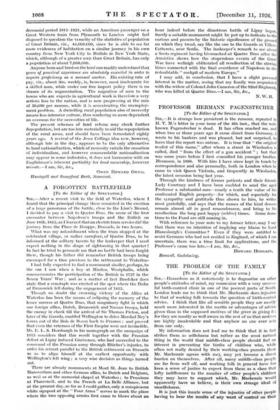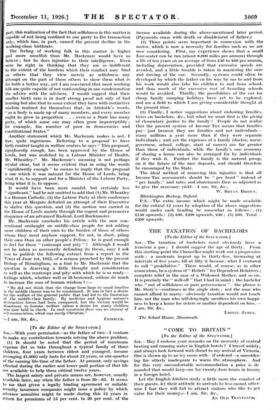THE PROBLEM OF THE FAMILY
[To the Editor of the SPECTATOR.] SIB,—Hazardous as it notoriously is to dogmatise on other people's attitudes of mind, my connexion with a very success• ful birth-control clinic in one of the poorest parts of South London leads me to think that Mr. Mackenzie does injustice to that of working folk towards the question of birth-control advice. I think that like all sensible people they are mostly much more interested in the merits or advantages of advice given than in the supposed motives of the giver in giving it ; for they are mostly as well aware as the rest of us that motives are highly incalculable and that anyhow no one ever acts from one only.
My information does not lead me to think that it in fact strikes them as selfishness but rather as the most natural thing in the world that middle-class people should feel an interest in preventing the births of children who, while often not really denied. by their working-class parents (here Mr. Mackenzie agrees with me), may yet become a direct burden on themselves. After all, many middle-class people are far from well off, and working folk in general have too keen a sense of justice to expect from them as a class that lofty indifference to the number of other people's children they may have to support which, Mr. Mackenzie would apparently have us believe, is their .own strange ideal of unselfishness.
It is just this innate sense of the injustice of other people having to bear the results of any want of control on their
part, this realization of the fact that selfishness in this matter is capable of not being confined to one party to the transaction only, which has, in part, caused the present decline in the working-class birthrate.
The feeling of working folk in this matter is higher and more unselfish than Mr. Mackenzie would have us believe ; but he does injustice to their intelligence. Even were he right in thinking that they are so indifferent to the extent of the burdens which their conduct 'may bind on others that they view merely as selfishness any attempt on the part of those others to show them what is for both a better way, yet I am convinced that most working folk are quite capable of not confounding in one condemnation the advice with the advisers. I would suggest that their smaller birth rate is in itself strong proof not only of bad housing but also that to some extent they have with instinctive wisdom realized for themselves that, in Aristotle's words, "as a body is made up of many members, and every member ought to grow in proportion . . . even so a State has many parts, of which some one may often grow imperceptibly ; for example, the number of poor in democracies and constitutional States."
Another statement which Mr. Mackenzie makes is not, I fear, quite ingenuous. Referring to a proposal to have birth control taught in welfare centres he says This proposal, significantly enough, has been approved by the House of Lords, but was scotched by a Labour Minister of Health, Mr. Wheatley." Mr. Mackenzie's meaning is not perhaps crystal clear, but it seems evident that in using the words significantly enough " he means to imply that the proposal is one which it was natural for, the House of Lords, being what it is, to support and for a Minister of the Labour Party, being what it is, to oppose.
It would have been more candid, but certainly less " significant," had he not omitted to add that (1) Mr. Wheatley is a Roman Catholic, (2) the Labour Party at their conference this year at Margate defeated an attempt of their Executive to shelve this question, and (3) the motion was carried in the House of Lords mainly through the cogent and persuasive eloquence of an advanced Radical, Lord Buckmaster.
Mr. Mackenzie concludes his article with the now con- ventional onslaught on middle-class people for not adding more children of their own to the burden of those of others whom they must anyhow support, for not, in short, piling their own Ossa on other people's Pelion ; he is good enough to feel for them " contempt and pity " ! Although I would not be taken as necessarily defending its thesis, may I ask you to publish the following extract from a report in the Times of June 1st, 1925, of a sermon preached by the present Bishop of Birmingham, as a hint to Mr. Mackenzie that the question is deserving a little thought and consideration as well as the contempt and pity with which he is so ready— feelings which, whether well or ill-bestowed, seldom do much to increase the sum of human wisdom ? :— " He did not think that the change from large to small families in the middle classes was to be condemned. It was in fact a desire for the welfare of the general public that had led to the limitation of the middle-class family. By medicine and hygiene nature's destructive forces had been conquered, but the victory would be disastrous to human welfare unless a desire for many children was now held in check. In such constraint there was an element of self-renunciation, which was surely Christian."
am, Sir, &c., CLINICUS.















































 Previous page
Previous page